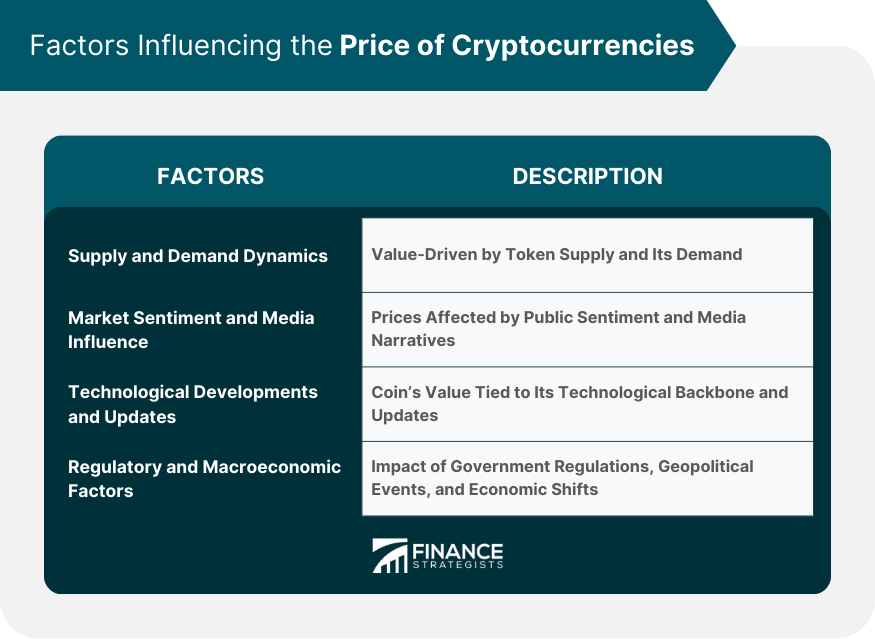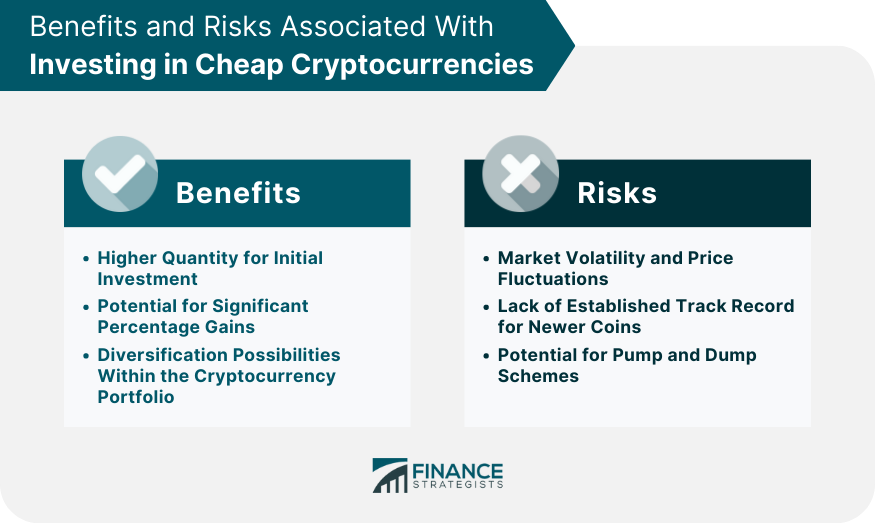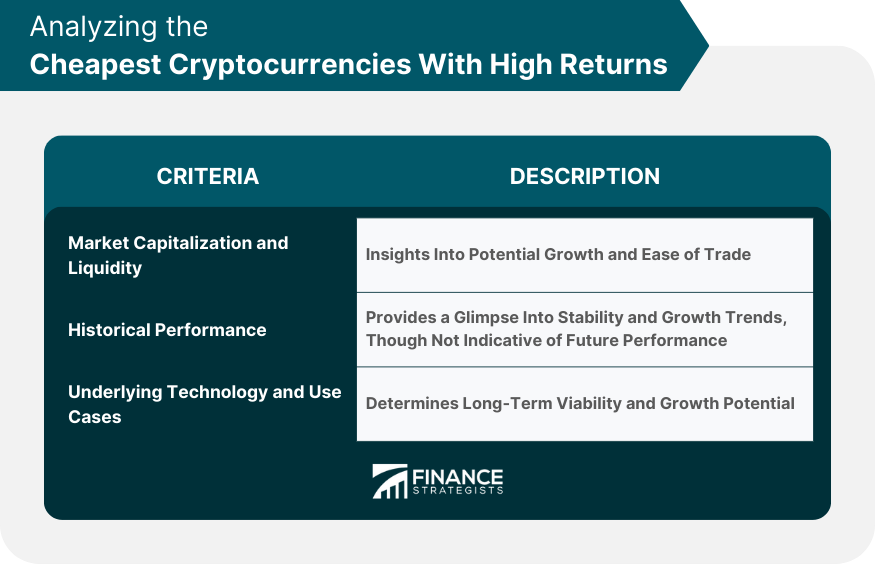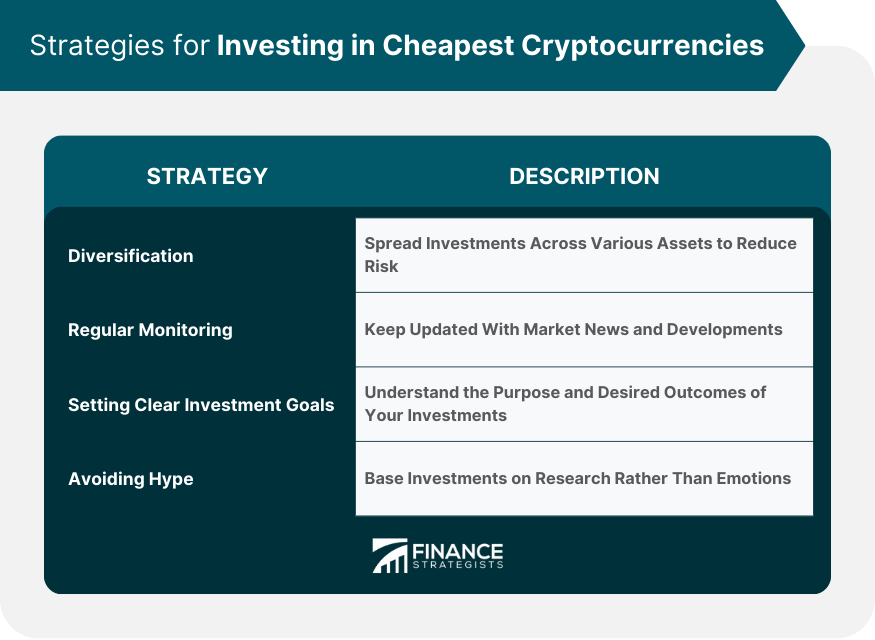In the dynamic world of cryptocurrencies, several "low-cost" tokens have shown promise for high returns. Such cryptocurrencies, often termed "altcoins", can offer immense growth potential due to their nascent stages and lesser-known status. Some popular choices include: Cardano (ADA): Lauded for its research-driven approach, Cardano offers a more secure and scalable blockchain. VeChain (VET): With its supply chain focus, VeChain promises to revolutionize how we track products. Ripple (XRP): Despite its legal controversies, XRP's cross-border payment solutions hold potential. Tron (TRX): Built to decentralize the web, Tron's unique approach and dedicated leadership make it a standout. Dogecoin (DOGE): Originally a meme, DOGE has shown significant growth thanks to its passionate community. However, with great returns comes great risk. It's crucial to conduct thorough research and consider one's risk tolerance before diving into the crypto market. Always invest what you can afford to lose. Just like traditional commodities, the value of a cryptocurrency is majorly driven by supply and demand. If a cryptocurrency has a high token supply but low demand, its price will be low. Conversely, if the supply is low and demand is high, the price will rise. The decentralized nature of cryptocurrencies makes them susceptible to public sentiment. Positive news can lead to price surges, while negative press can cause declines. Media plays a pivotal role in shaping these sentiments. The value of a cryptocurrency is also determined by its underlying technology. Frequent updates, scaling solutions, and other tech advancements can boost a coin's credibility and, in turn, its price. Government regulations, geopolitical events, and economic shifts can significantly impact cryptocurrency prices. Countries embracing or rejecting crypto can affect its adoption and, consequently, its value. Investing in cheaper cryptocurrencies allows investors to hold a larger number of tokens for a smaller amount of capital, increasing the potential for returns if the price rises. Low-cost cryptocurrencies can offer substantial percentage gains. A minor price movement in a cheap coin can represent a significant percentage increase, potentially offering higher returns. Owning a mix of high and low-cost cryptocurrencies can balance out a portfolio, reducing risk and increasing potential returns. Cryptocurrency markets are notoriously volatile. Prices can skyrocket, but they can also plummet. This volatility is even more pronounced in low-cost cryptocurrencies, which might not have established stability. Newer, low-cost cryptocurrencies might not have a long history to analyze, making their investment riskier. Cheap cryptocurrencies are sometimes targets for "pump and dump" schemes, where prices are artificially inflated (pumped) and then suddenly sold off (dumped), leading to rapid price declines. A cryptocurrency's market cap can give insights into its potential growth. Similarly, liquidity showcases how easily a coin can be bought or sold in the market without causing drastic price changes. While past performance is not indicative of future results, analyzing how a coin has historically performed can give some insight into its stability and growth trajectory. A cryptocurrency's value proposition, technological foundation, and real-world use cases can determine its long-term viability and potential for growth. Spreading investments across a diverse range of assets, including a mix of cryptocurrencies, reduces risk. Keeping a keen eye on market news, technological developments, and regulatory updates can provide insights and help in making informed decisions. It's important to know why you're investing and what you aim to achieve. Setting clear goals helps in creating a roadmap for your investment journey. Investing based on hype or FOMO (fear of missing out) can be perilous. Sound investments are based on research and understanding, not emotion. The cryptocurrency market, vibrant and ever-changing, has presented opportunities with low-cost tokens, notably "altcoins," known for their potential high returns. Standouts include Cardano, VeChain, Ripple, Tron, and Dogecoin. Key drivers influencing cryptocurrency prices encompass supply-demand dynamics, media sentiment, technological advancements, and regulatory factors. Investing in cheaper coins offers benefits like obtaining a larger token quantity and diversification. However, these investments come with inherent risks: pronounced market volatility, a lack of historical data, and susceptibility to market manipulations like "pump and dump" schemes. Evaluating such investments necessitates considering factors like market capitalization, historical performance, and the coin's technological backbone. Effective strategies for navigating this space include diversifying investments, staying updated, setting precise goals, and steering clear of market hype. In essence, while the allure of low-cost cryptocurrencies is undeniable, thorough research and informed decision-making remain paramount.Cheapest Cryptocurrencies With High Returns: Overview
Factors Influencing the Price of Cryptocurrencies
Supply and Demand Dynamics
Market Sentiment and Media Influence
Technological Developments and Updates
Regulatory and Macroeconomic Factors

Potential Benefits of Investing in Low-Cost Cryptocurrencies
Higher Quantity for Initial Investment
Potential for Significant Percentage Gains
Diversification Possibilities Within the Cryptocurrency Portfolio
Risks Associated With Investing in Cheap Cryptocurrencies
Market Volatility and Price Fluctuations
Lack of Established Track Record for Newer Coins
Potential for Pump and Dump Schemes

Analyzing the Cheapest Cryptocurrencies With High Returns
Market Capitalization and Liquidity
Historical Performance
Underlying Technology and Use Cases

Strategies for Investing in Cheap Cryptocurrencies
Diversification
Regular Monitoring
Setting Clear Investment Goals
Avoiding Hype

Conclusion
Cheapest Cryptocurrencies With High Returns FAQs
The main attractions include the possibility of significant percentage gains, the ability to obtain a larger quantity of tokens with a limited budget, and the potential for diversifying a crypto portfolio.
Analyze based on criteria like market capitalization, liquidity, historical performance, underlying technology, and real-world use cases. Always ensure thorough research before investing.
Risks include market volatility, lack of an established track record for newer coins, and susceptibility to pump-and-dump schemes.
While success stories provide insights, they should not be the sole basis for investment decisions. It's crucial to do independent research, understand market dynamics, and consider personal risk tolerance.
Yes, diversifying your investments, setting clear investment goals, regularly monitoring the market, and avoiding decisions based solely on hype can help minimize risk.
True Tamplin is a published author, public speaker, CEO of UpDigital, and founder of Finance Strategists.
True is a Certified Educator in Personal Finance (CEPF®), author of The Handy Financial Ratios Guide, a member of the Society for Advancing Business Editing and Writing, contributes to his financial education site, Finance Strategists, and has spoken to various financial communities such as the CFA Institute, as well as university students like his Alma mater, Biola University, where he received a bachelor of science in business and data analytics.
To learn more about True, visit his personal website or view his author profiles on Amazon, Nasdaq and Forbes.











